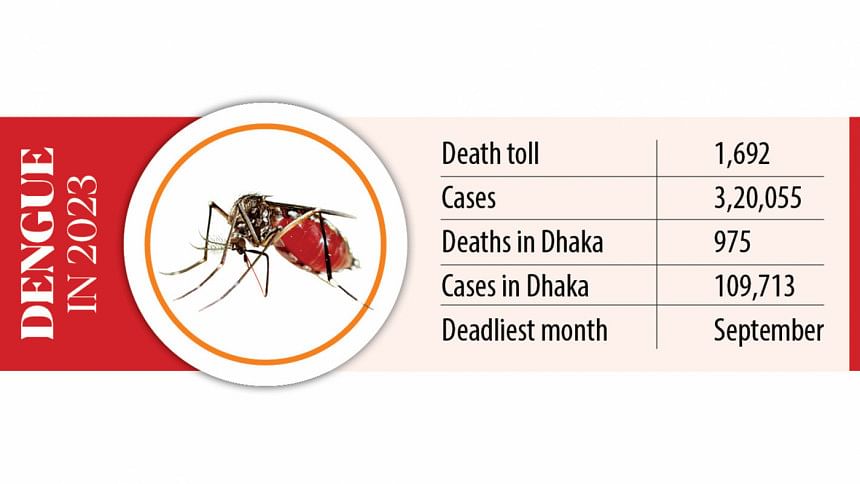Preventing Dengue Outbreak: Authorities yet to take early steps

The authorities have apparently not learned any lessons from this year's dengue outbreak that saw records tumble both in terms of death toll and hospitalisation.
City corporations and other local government bodies are yet to take any measures to prevent another deadly outbreak of the mosquito-borne disease during monsoon next year, experts say.
Judging by what happened this year, they say the situation may worsen in 2024 unless there is a proper plan and effective surveillance from the beginning.
According to entomologist GM Saifur Rahman, the authorities do not seem to be procuring the equipment needed for effective surveillance. "They are rather likely to follow the same old methods that are ineffective."
As of yesterday, over 3.20 lakh people have been diagnosed with the disease this year. Of them, 1,692 died, according to data from the Directorate General of Health Services.
Saifur points out that the data does not reflect the real picture because a large number of dengue infections and subsequent deaths go unreported.
A case is recorded only when an individual receives inpatient treatment at one of the 138 hospitals that send information to the DGHS. The rest of the country's around 16,000 facilities do not provide the health directorate with data.
Dengue is a reportable disease in many countries, meaning data on every single patient is recorded, Saifur adds.
Entomologist Manzur A Chowdhury says in the absence of data on the exact number of patients, their locations and distribution of serotypes or closely related forms of the virus, the vector control programme would not be effective.
"Without information, it is not possible to kill adult mosquitoes and destroy the larvae in clusters," he adds.
The government should start surveillance from January. "If they start the process in the lean season, they will be able to lower the risks of a widespread outbreak," he says.
He recommends using devices called ultra-low volume machines that spray pesticide in the air in the form of a mist.
Unless the management is efficient and free of corruption, modern equipment alone will not control the Aedes population, he says.
Awareness among people can also play a key role in reducing the number of breeding grounds, he adds.
Entomologist Prof Kabirul Bashar of Jahangirnagar University recommends that the government make a national plan outlining the ways to control Aedes mosquitoes and the type of insecticide to use.
The local government ministry should train employees of the city corporations, zila parishads, and union parishads, he adds.
Muhammad Tajul Islam, minister for local government and rural development, also has fears of another dengue outbreak.
"We will start our activities in January. But it is not possible for the city corporations alone to fight the menace. Everyone, especially the residents, will have to come forward," he said.
The breeding grounds of Aedes are mainly in the houses, rooftops and yards, he says, adding that the authorities mainly conduct anti-mosquito drives outside the houses, but mosquitoes usually stay inside.
Dhaka North City Corporation Mayor Md Atiqul Islam said the corporation sought 10 entomologists from the agriculture ministry to conduct surveys to know about the density of Aedes mosquitoes round the year.
"But it will not be possible for us to start the work with the entomologists before February because of the national election and some other matters," he says.
Dhaka South City Corporation's Chief Health Officer Fazle Shamsul Kabir says the corporation's emphasis is on awareness campaigns, and the plans for next year will be disclosed soon.

 For all latest news, follow The Daily Star's Google News channel.
For all latest news, follow The Daily Star's Google News channel. 



Comments